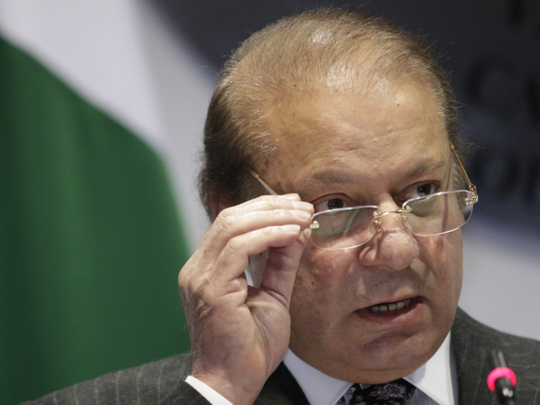
The joy of celebrating a new year will be no different across Pakistan today, given the planned festivities across the globe. And yet, the powerful reality of the country moving effectively towards another parliamentary election in just over a year’s time must cast a shadow over celebrating any event, given that Pakistan’s outlook continues to slide.
Youngsters in Pakistan will mark the advent of 2017 with celebrations. However, while there will be high-profile parties for the richest of the rich, the poorest of the poor will be amused by the crackle of gunfire near their deprived neighbourhoods. And while that happens, it will be difficult to ignore the dark clouds hovering at the horizon. As time moves on, events of the past years — notably the past 12 months — have raised the horrible spectre of Pakistan being pushed backwards.
As the country’s mainstream political rivals sharpen their knives for what could turn out to be a vicious political campaign till mid-2018, when general elections are due, their messages continue to ring hollow for ordinary Pakistanis. Events of the past year have vividly illustrated the yawning gap that divides members of Pakistan’s ruling structure from those who are ruled.
During this time, Prime Minister Nawaz Sharif has been surrounded by the all-too-familiar ‘Panama gates’ scandal — a reference to the chance discovery of billions of rupees in wealth belonging to his three children, stashed away in Panama-based offshore companies. Though the opposition-backed demand for a thorough investigation in this affair has remained inconclusive, the saga has indeed further exposed the increasingly weak moral authority of top members of the ruling political structure.
At the same time, the opposition led by former president Asif Ali Zardari’s Pakistan People’s Party (PPP) has faced its own challenges. The arrest and continued detention of Doctor Asim Hussain, the former PPP petroleum minister and widely reputed as a close confidante of Zardari, has raised troubling new questions over the party’s ability to come clean on issues of reputation. The PPP’s five-year rule in Islamabad,, from 2008 till 2013, saw one controversy after another rocking the establishment, ranging from recurring accusations of corruption to a simple failure to perform.
In between these two extremes — Sharif’s Pakistan Muslim League-Nawaz (PML-N) and the PPP — lies the Pakistan Tehreek-e-Insaaf (PTI) led by Pakistan’s former cricket captain-turned philanthropist and politician Imran Khan. Many of Imran’s critics have noted his detachment from the cold realities of politics in south Asia, where graft and deal-making often drive the political order. Though appearing to be unrealistically idealistic at times, Imran continues to carry the banner of pushing the country towards progressive change.
And yet, on his own, Imran has few prospects of leading the country towards the kind of radical change that is needed to transform Pakistan for the better. Between the PML-N and the PPP, and with various shades of regional political players, Pakistan remains caught in the clutches of vested interests with little ability to reform the country without compromising their own interests.
A quick review of the priorities for economic development as devised by the PML-N, fully reveals the gap between Pakistan’s realities and the country’s mainstream. Prime minister Sharif and his political followers miss out no opportunity of reminding Pakistanis of a radical change about to come, thanks to plans such as a network of high speed motorways and modern fast moving trains alongside fancy new airports set to emerge in the coming years.
And yet, the mother of all tragedies must remain the degree to which such plans show little evidence of tackling fundamental human needs like a radical expansion and qualitative lift in government provided medical care and schools. Consequently, with these fundamental needs increasingly provided by the private sector and that too without firm regulatory controls, the costs will simply soar and the sufferings of ordinary Pakistanis will just grow.
Meanwhile, leaders of the two mainstream parties often take pride in presiding over a visible improvement in security conditions from the time when Taliban militants presented a much greater challenge to the country’s mainstream. It is true that a two-year-long intense campaign by the Pakistan army in parts of the unruly tribal areas along the Afghanistan border, has brought about some relief in Pakistan. Ironically, however, there is a large canvas across Pakistan’s security front where the challenge is far from over.
Without fundamental reforms to improve policing and law enforcement at the grass roots, any number of success stories in pushing back the tide of militancy will remain at least partially inconclusive. Other key areas that are central to revamping Pakistan’s law and order environment must include the workings of the lowest courts that are typically the first forum of appearance for suspected criminals. A failure to nail down those found guilty in courts can easily undo progress that has been made to bring such individuals to justice.
And last but not the least, the workings of Pakistan’s economic environment will inevitably lay the course for the country’s ability to tackle lawlessness. For years, successive governments have typically pat themselves on their backs in claiming success for overseeing an economic upturn, with little to show for results.
Over the years, the lives of the poorest of the poor, who comprise at least one-thirds of the country’s population, have seen little or no improvement. Consequently, such gaps will continue to raise troubling questions over the quality of democracy that Pakistan’s mainstream politicians consider as a matter of pride. The writing on the wall is all too clear: Marginalised Pakistanis keep going through the daily grind without feeling any change for the better, irrespective of the calendar year warmly welcomed by some.
Farhan Bokhari is a Pakistan-based commentator who writes on political and economic matters.









